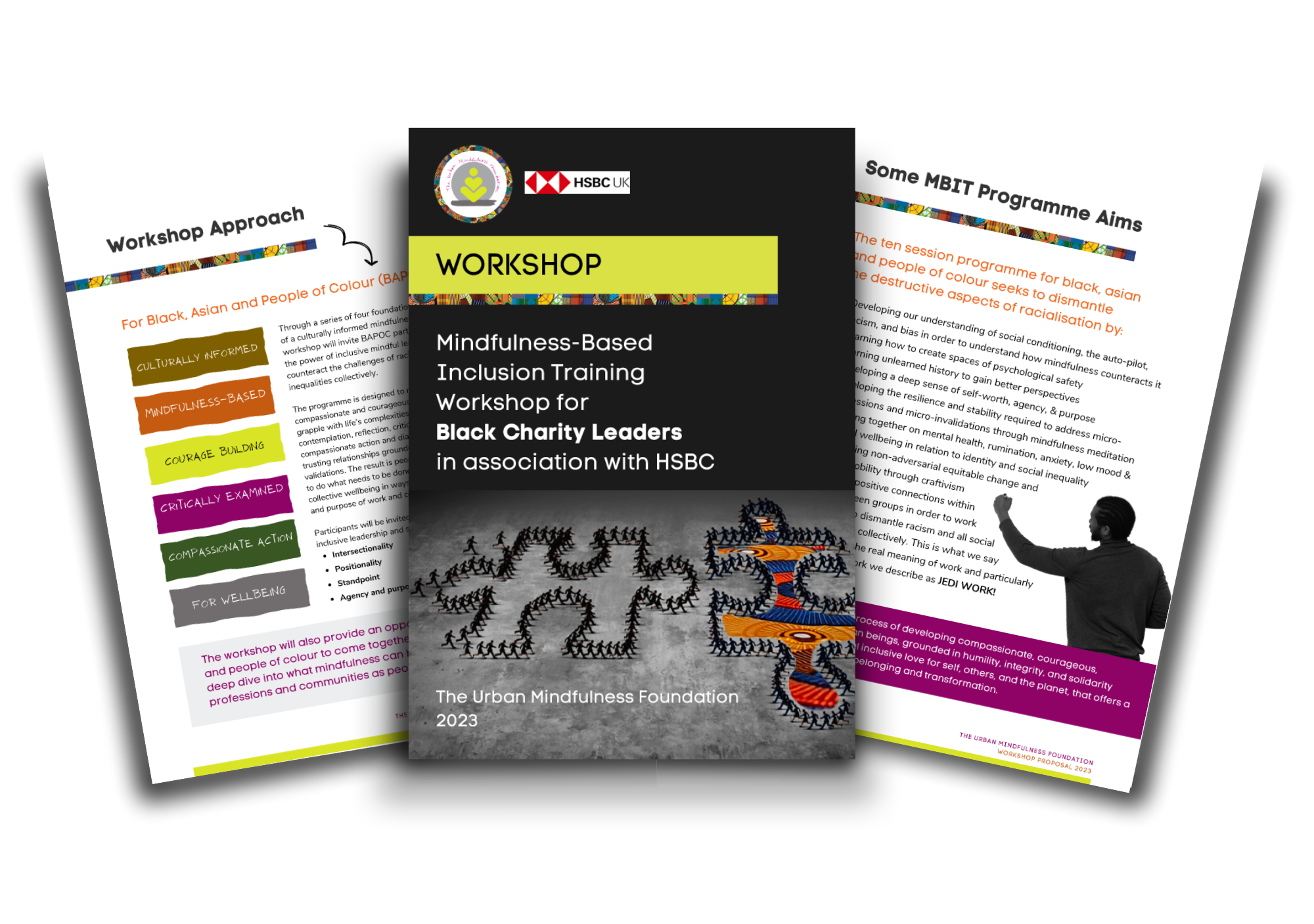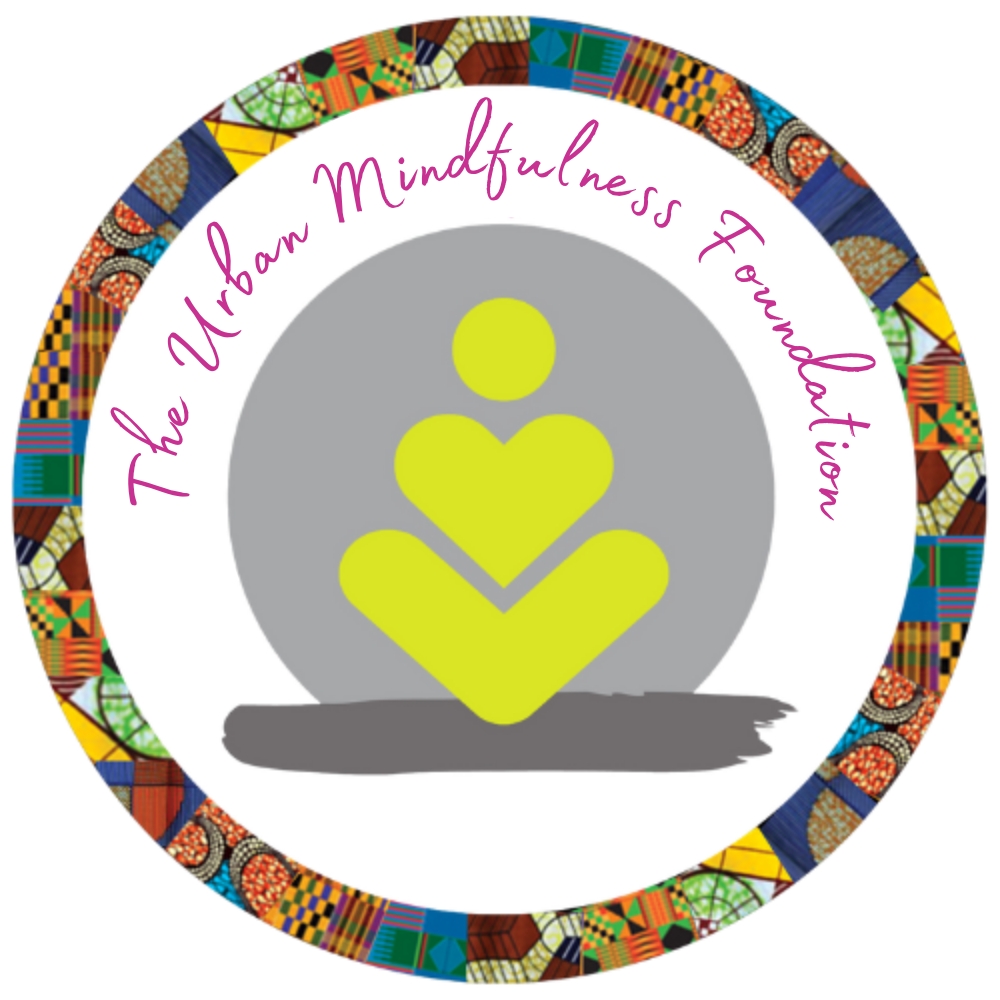Mindfulness in the workplace
It may be no surprise that organisations such as London Transport, Goldman Sachs, Apple, Google, Virgin Atlantic and HSBC for example offer mindfulness training programmes to Staff, Senior Management and Customers.
Most recently, we enjoyed collaborating on a small project with HSBC.
In this project, The Urban Mindfulness was appointed by HSBC to deliver an introductory workshop on our inclusive mindfulness training to a linked charitable organisation, Black Charity Leaders (BCL). This important collaboration was a great piece of work requested by HSBC to bring awareness to mindfulness to the organisation from a black and people of colour perspective.
Significantly, this project has helped the Urban Mindfulness Foundation shape the purpose and focus of its workplace interventions to cover:
- Mindfulness-based JEDI awareness training
- Policy and Strategy reviews and development
- Mindfulness-based JEDI events and seminars
We can also help you review your inclusive leadership strategy in ways that help to enhance your recruitment, people development, talent retention and motivation. By building an inclusive and diverse culture within your organisation, discrimination is recognised and compassionately neutralised collaboratively. By nurturing an inclusive culture, we also know we capture a competitive advantage that leads and influences beyond our boundaries and typical circles of influence.
Our JEDI at work initiatives help leaders expand their capabilities and impact by acknowledging and recognising the under-utilised and underdeveloped talents around them. This action results in marginalised members of the workplace feeling included as they are more actively engaged and listened to and given agency that uplifts personal and collective performance.
With great feedback on our recent workshop delivered to Black Charity Leaders in collaboration with HSBC, we continue to develop our relationships with Businesses and Organisations who have a clear charitable and ethical element to their operations and who wish to bring about different perspectives and reasons for bringing mindfulness into the workplace beyond the uplift of mental health and profits.

Inclusive Leadership
Utilising the practice of mindfulness, we help provide, facilitate and implement inclusive leadership strategies and insights designed to maximise the benefits for businesses wishing to harness the beauty of diversity that embraces differences and connects through our common humanity. Our work supports your business achievements that will extend to greater staff engagement, loyalty, motivation, and retention. This is achieved by utilising mindfulness-based JEDI strategies that are rooted in social mindfulness and is designed to bring people together at the heart level.
If your teams feel they are treated fairly and their talents are recognised, acknowledged and utilised, we can create a sense of belonging that results in better performance and an increased bottom-line advantage that is rooted in the ethical foundations of loving-kindness.
By creating a business that has an inclusive leadership mindset, your team will feel valued, worthy, recognised, seen and heard. Likewise, by nurturing an environment that welcomes and accepts diversity and difference with kindness, compassion and respect, employees can reach their full potential in ways that enhance the personal and collective outcomes of any business.
From our perspective, when bringing mindfulness into the workplace, it is fundamentally important that it is introduced in a way that is focused on creating justice, equity, diversity and inclusion for all staff alongside the creation of an inclusive workforce and working environment that aids staff working strategically together in ways that ensure everyone feels valued.
Whilst there is much to be said about the benefits of having mindful, inclusive and diversified staff, including inceased abilities to function in ways that uplift productivity. From an Urban Mindfulness Foundation perspective, the uplift in productivity as an outcome is only ancillary or subsidiary to creating systems of working whereby the powers of diversity, solidarity and inclusion are fully harnessed for the well-being of the entire workforce.
This means the creation of livelihoods and infrastructures that are appropriately proportioned and adaptable to the current needs and concerns we face in the inevitability of a continuously changing society.
Whilst there is much importance and perhaps valuable research relating to the financial benefits of implementing mindfulness and inclusion in the workplace. Our work includes assessing what happens when financial uplift is created. Who and how will diverse communities and individuals benefit from any uplifts, and if not, why not?
By inviting businesses to reflect on this question upfront when introducing mindfulness and inclusion into the workplace, UMF facilitates clarity and collaboration on what the inevitable uplift will be redirected into. This is important to the Urban Mindfulness Foundation as we are committed to ensuring our work leads to equitable outcomes that are rooted in compassionate actions that influence beyond the business boundaries.
Whether it is the cleaning staff, security or the chief executives, we aim to provide inclusive contemplative spaces in the workplace where the normal power structures and hierarchy can be set aside, and our common humanity can be centred, embraced, validated, recognised and loved. By coming together to sit together in mindfulness practice at work simply, we believe opportunities for new insights to arise into creating a unified and happy workforce that feels listened to, valued and cared for will emerge.
Introducing mindfulness in the workplace for the Urban Mindfulness Foundation is about supporting the business to connect with its deepest humanitarian purposes and, therefore, utilising its corporate responsibilities and capabilities to facilitate those deepest humanitarian purposes coming to fruition.
Cultivating equity, equality diversity and inclusion using mindfulness at work.
The Urban Mindfulness Foundation believe that a dual approach to bringing JEDI into the workplace is essential to engage the whole team. Whether you want to consider how diverse your board is, or you wish to develop inclusive leadership principles amongst your team or managers, or you wish to understand how equality, diversity and inclusion can be introduced or embedded into your culture and practice, we will work with you to achieve your JEDI goals and legal obligations.
With the vision to culitvate a level of respect and appreciation for all wisdoms and perspectives and participants who come together to make the business operations possible. The Urban Mindfulness Foundation help businesses anchor themselves in a deeper moral and ethical purpose of operating that is rooted in the responsibilities and accountabilities of the business to its empoyees, customers and society.
Important critiques of mindfulness in the workplace that our interventions aim to address
Some practitioners and scholars have challenged the moral and ethical foundations of mindfulness in the workplace over the years. Critiques of mindfulness in the workplace include ideas that it is being utilised to pacify workers whilst at the same time getting more out of them. Now whilst there are also many rebuttals to such critique, we have listened at the Urban Mindfulness Foundation, and shaped a programme that is rooted in compassionate collective action and solidarity that is fundamentally about raising unheard voices, providing staff with agency, purpose and ownership that seeks to ensure that whilst productivity may increase, such increases are channelled for the benefit of those who are working together to create such increases or causes agreed by the workforce as necessary to give this work an ethical and moral foundation.
Some classic and important critiques that mindfulness practitioners need to grapple with comes from Ron Pursar and David Forbes who we recommend all practitioners read up on to understand and address the concerns of mindfulness in the more humbly.
It is important that mindfulness is not taught as a hyper-individualised intervention under the strain of productivity and profitability in the workplace. When used this way, mindfulness can easily become co-opted to influence conformity to the extent it limits the potential of mindfulness to be socially transformational.
Consequently, it is essential to highlight that we take great care to ensure our mindfulness programmes for the workplace are grounded in moral and ethical frameworks of solidarity building through equity, equality, diversity and inclusion, and not just simply increasing profits.
Something that we consider risks reducing ancient wisdom and spiritual traditional practices to a capitalist tool for more productivity that would represent a repeat pattern of appropriation and western colonisation of mindfulness that can tip the scales of its application into something quite disrespectful.
As such, we only engage in mindfulness provisions in the workplace where there is a clear commitment to JEDI work and nurturing the cultural shift towards reimagining the purpose of work and business as a development and well-being initiative, that offers people a sense of agency, purpose and validation in ways that are rooted in greater equity, equality, diversity and inclusion that is at the core of the MBIT programme for workplaces.
Our requirements for delivery of mindfulness in the workplace.
Naturally we are open to working with all charities, NGO’s and public sector organisations as a priority. However, whilst we are happy to service businesses that operate in the private sector, it will be important for us to define a clear understanding of the intentions and motivations behind bringing mindfulness into the business so the organisation and practitioner can be sure the values of implementation align with an ethically grounded JEDI practice.
From the perspective of The Urban Mindfulness Foundation, we only engage in mindfulness provisions outside the charity, NGO or public sector if the practice delivery is grounded in addressing Equality, Equity, Diversity and inclusion or the organisation has clear charitable endeavours or charitable elements to its operation. This commitment underpins our CIC values and the practice of mindfulness delivered within a moral and ethical framework that limits the risks discussed above.
For more information on our offerings for Mindfulness in the workplace, please contact us here.
Alternatively, we are delighted to share the work of our friends at the Mindful Workplace Community.
All profits from any of our services to the NHS and Health Care Institutions are directed towards ensuring the ongoing provision of Free context-specific and culturally aware mindfulness training for those from disadvantaged, underserved and marginalised communities who would not normally be able to access mindfulness training due to relatability or costs.
